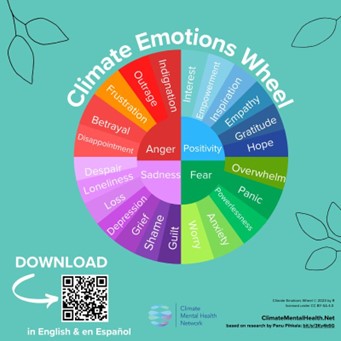Climate Crisis and Mental Health

Ever feel your stomach drop when seeing headlines about record-breaking temperatures, or anxiously swipe away news about the climate crisis? Or have you felt hopeless or angry about inaction and slow progress on fighting climate change? Maybe you’ve felt excited and good about yourself when you’ve taken an action for the climate. You might feel nothing about the climate crisis at all, or that it’s really taken a toll on your mental health. Either way, you’re not alone!
The impact the climate crisis has on our mental health is increasingly recognised and talked about. Young people seem to be especially affected: in a large, international study of 10,000 young people, around 60% reported feeling anxious about climate change (Hickman et al., 2021). Research shows that people feel a variety of emotions, including anxiety, sadness, anger, guilt, hope, hopelessness, excitement, despair, and many more. Terms such as eco- or climate anxiety, climate distress and so on have been introduced to label this emotional impact of the climate crisis. Climate emotions are also a social justice issue: people who are most marginalised will feel effects of the climate crisis most strongly, thereby also increasing their emotional vulnerability to the crisis.
While some people’s mental health is impacted so much by the climate crisis that they will need professional support, feeling impacted emotionally should not be “pathologised”. Many researchers and mental health professionals view climate distress as a healthy, adaptive response to a real threat (Wray, 2022). Emotions work as signals for our needs and to motivate us, and climate emotions can likewise communicate a need for us to seek support, take action or demand it from those in power. Research has shown that the lack of meaningful action from decision-makers (e.g., in politics, industry) can actually exacerbate the distress people feel about the crisis (Hickman et al., 2021). Some view those who do not feel emotional about the climate crisis as engaging in defence mechanisms such as denial and suppression. From this perspective, feeling the impact of the climate crisis is a sign of actually confronting it and breaking through defence mechanisms.
How to Navigate Climate Emotions
Even though feeling the emotional impact of the climate crisis can be seen as a healthy response, they still require us to engage with them. One idea is to use these feelings as motivation to take action, and that action can be an “antidote to despair” (Joan Baez). Many people report that taking action, either individually with their behaviours or by taking collective action, like signing petitions, voting, going to protests etc., helps with their climate emotions. However, given the limitations of individual people’s actions, only responding to the distress about the crisis by taking action can lead to getting exhausted, frustrated, or burnt out.
Caroline Hickman (2023), a climate-sensitive psychotherapist and researcher of climate emotions, suggests that to tolerate the weight of the climate crisis long-term, we need to build our inner resilience and engage with the difficult emotions it brings up. She calls this “internal activism” and suggests that it can involve self-care, sharing with friends or family, seeking connection with others and finding a community of others concerned about the climate crisis. Research suggests that we need balance between taking action, processing emotions, and distancing ourselves from the crisis (Pihkala, 2022). Doing what we (realistically) can in terms of activism or changing behaviours contributing to the climate crisis can help, but should come alongside taking breaks, grieving losses and working through our emotions. As the climate crisis continues, it is normal and natural to change and flip between different emotions and levels of upset. Internal activism and sharing about these feelings can help build our resilience throughout this process.
Importantly, if someone is affected by distress about the climate crisis to an extent that it interferes with their daily life and mental health, professional support can help to build resilience in navigating the climate crisis.

Resources
- "Generation Dread" blog by Britt Wray
- Climate Psychology Alliance: Community of researchers, mental health professionals, artists etc. working on psychology and emotions of climate change. Their website links to available supports and events.
- XR Ireland and Friends of the Earth Ireland regularly run climate cafes/chats where people meet and discuss their feelings about the climate crisis
- “Generation Dread: Finding Purpose in an Age of Climate Crisis” (Britt Wray) (available at TCD library)
- “A Field Guide to Climate Anxiety How to Keep Your Cool on a Warming Planet” (Sarah J. Ray) (available at TCD library PCs)
- “Learning to Live with Climate Change: From Anxiety to Transformation” (Dr Blanche Verlie) (Open source book)
Sources
- Hickman, C. (2023). Feeling okay with not feeling okay: Helping children and young people make meaning from their experience of climate emergency. In L. Aspey, C. Jackson, & D. Parker (Eds.), Holding the Hope: Reviving psychological and spiritual agency in the face of climate change. PCCS Books.
- Hickman, C., Marks, E., Pihkala, P., Clayton, S., Lewandowski, E. R., Mayall, E. E., Wray, B., Mellor, C., & van Susteren, L. (2021). Young people's voices on climate anxiety, government betrayal and moral injury: A global phenomenon. Government Betrayal and Moral Injury: A Global Phenomenon.
- Pihkala, P. (2022). The Process of Eco-Anxiety and Ecological Grief: A Narrative Review and a New Proposal. Sustainability, 14 (24), 16628.
- Wray, B. (2022). Generation dread: finding purpose in an age of climate crisis. Knopf Canada.

